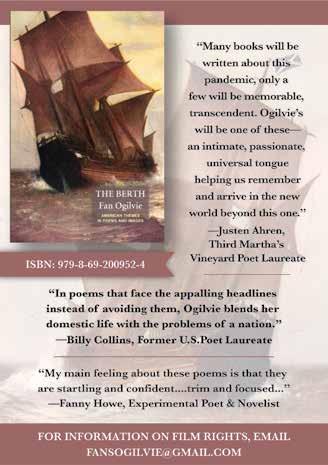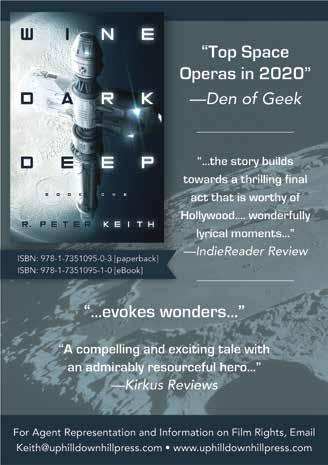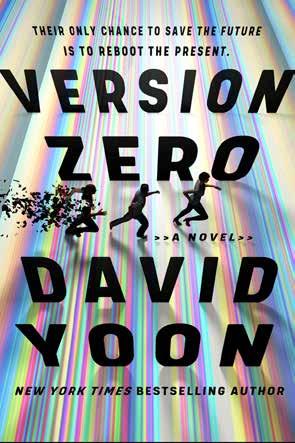
17 minute read
THE PASSENGER by Ulrich Alexander Boschwitz
extreme cancer treatments, she begins an affair with Dante. She can’t resist the charming Italian and his love for the island and its history, even as she keeps her diagnosis secret. Slowly, the group bonds into something like a family. The novel grapples with the question of what terminally ill people owe their loved ones and themselves. While her best friend is furious that Lizzie might refuse further treatment, Lizzie worries that her illness is a burden. She feels guilty for falling in love with Dante and his daughter, knowing her time is limited. Bly makes an interesting narrative choice, telling the story from the points of view of Lizzie and Etta, Dante’s daughter. Etta is knowledgeable enough about literature to banter with Lizzie about Herman Hesse’s Siddhartha and gender roles in Shakespeare’s plays, but she’s still a child, and her perspective confines the reader’s experience of the book.
An emotional journey that’s stunted by the way it’s told.
THE PASSENGER
Boschwitz, Ulrich Alexander Metropolitan/Henry Holt (288 pp.) $24.99 | Apr. 13, 2021 978-1250317148
A newly rediscovered masterpiece set in the days following Kristallnacht. When pounding erupts at the front door of his Berlin apartment with voices crying out for his arrest, Otto Silbermann escapes out the back. It’s Kristallnacht, 1938, and Silbermann, a wealthy, respectable, and—crucially—Jewish businessman doesn’t know where to go. He takes a train, and then another. He goes from Berlin to Hamburg and then back to Berlin. He goes to Aachen and Dresden and Berlin once again. Days pass, and Silbermann is still on a train. His name is recognizably Jewish, so he avoids using it—no hotels for Silbermann, with their registration forms—but his face is not, and his bearing is so upright and respectable he doesn’t seem particularly suspect. Still, he’s in constant danger of arrest. In its dark absurdity, Boschwitz’s brilliant novel recalls Kafka, particularly The Trial, in which threat looms like an edifice—and yet, reading, you’re also struck by a panicked, choking laughter. And like Tolstoy’s Ivan Ilyich, Silbermann thinks that by clinging to the last vestiges of middle-class life, he can avoid or outpace death. “Am I traveling?” Silbermann wonders. “No! I’m stuck in the same place, like a person who takes refuge in a cinema where he sits in his seat without moving as the films flicker away—and all the while his worries are lurking just outside the exit.” Then, too, the story behind the novel’s publication is almost as intriguing as the novel itself. Boschwitz, who was half Jewish, was only 23 when he wrote the book; he died in 1942 on a transport ship traveling from Australia to England under German bombardment. The novel briefly appeared in Britain and the United States but never in the German original. In 2015, it was rediscovered by chance. Boschwitz is remarkable not only for his prescience—the novel might be one of the very earliest depictions of the aftermath of Kristallnacht—but also for his rare insight and minutely observed depictions of characters from every strata of German society.
Witty at the same time that it’s tragic, surreal even in its hyper-reality, Boschwitz’s novel is a remarkable achievement.
THE TIGER MOM’S TALE
Butler, Lyn Liao Berkley (352 pp.) $16.99 paper | Jul. 6, 2021 978-0-593198-72-8
Butler’s debut novel delves into a biracial Taiwanese American woman’s complicated family relations.
Protagonist Lexa, a 30-something physical trainer in New York City, is building her client list and looking for
godspeed
love at the novel’s start. She’s estranged from her biological father in Taiwan, and the White side of her family has fallen into conflict. Her White American mother has left Lexa’s stepfather for a woman, and Lexa’s bigoted sister is acting out. Then Lexa discovers her father, Jing Tao, has died, and her Taiwanese half sister, Hsu-Ling, is flying to New York to hand-deliver an important letter about her inheritance. Melodramatic plot twists pile on with lightning speed, but a dinner scene in which Lexa and her two half sisters confront a White man with “yellow fever,” intent on objectifying Asian women, is hilarious. Other plot points suffer from a reliance on stereotypes. The central mystery of the novel, the cause of Lexa’s estrangement from her biological father, is unfortunately predicated on a misogynist and racist caricature. Jing Tao’s wife, Pin-Yen, is literally referred to as a Tiger Mom and is characterized in broad strokes: She forces piano lessons on her own daughter and pushes for academic success. Pin-Yen commits truly egregious acts of cruelty against the 14-year-old Lexa, but her cartoonish villainy undermines the book. If Jing Tao is truly the enlightened, loving man the reader is told he is, what would have sustained his marriage to a woman so monstrous? Why can’t he and his wife communicate with each other like adults? That Jing Tao never noticed his wife’s manipulations is a convenient plot device that reveals how underwritten he is as a character. The novel is trying for a breezy, sometimes-comical, sometimes-sentimental depiction of family and heritage, but such paper-thin characterizations undermine its own good intention.
Family drama cannot transcend soap-operatic plot twists and too-easy resolutions.
GODSPEED
Butler, Nickolas Putnam (352 pp.) $27.00 | Jul. 27, 2021 978-0-593-19041-8
A trophy house, a struggling construction company, and an impossible deadline frame this tense story of greed and friendship. Bart, Cole, and Teddy, blue-collar buddies since Utah childhoods, are now pushing 40 and business partners just getting by on small jobs in Wyoming’s Jackson Hole valley. Their prospects brighten when a wealthy West Coast lawyer named Gretchen offers them the contract to finish her eight-figure house in progress in the mountains outside town. It’s a lot of money for the job itself and comes with a hefty bonus if the men meet her deadline. That’s one problem, because she wants to move in within four months, a near impossibility given the work involved. There’s also the question of why the previous contractors didn’t stick with such a lucrative gig, not to mention the man who died in an accident on the site. But a six-figure bonus crushes a lot of misgivings. For almost half the book, Butler dwells on the beauty of the house and site, the builder’s dreams, the deadline’s pressure, the haves and have-nots as “more and more out-of-state money poured into their quaint little ski town.” The pace drags with repetition and lack of surprise. Fortunately the second half shifts into another gear, characters evolve amid the stress and several neat twists, and the action moves almost like a thriller to a stunning climax. As in his previous three novels, Butler brings sympathy and insight to the familiar rituals and dynamics of male friendship. He might have done more with Gretchen. She has an intriguing backstory that doesn’t develop, and while she’s an impressive force when onstage, the plot mostly keeps her in the wings.
An exceptional tale, once it gets going, of what money can do to those who need it.

THE WOMEN’S MARCH
Chiaverini, Jennifer Morrow/HarperCollins (352 pp.) $28.99 | Jul. 27, 2021 978-0-06-297600-0
Suffragettes work to advance their cause by planning a march in Washington, D.C. Leading up to the 1912 election, Maud Malone, a librarian advocating for women’s right to vote, becomes known as a heckler after being arrested for interrupting political rallies to ask presidential candidates their opinions on the issue. After the election, she joins a group of women marching from New York City to Washington, D.C., to ask the newly elected Woodrow Wilson to mention women’s suffrage in his inaugural address. They plan to join the national march for suffrage being planned by Alice Paul, a Quaker from Pennsylvania who spent several years working with the British suffragettes. Yet Alice’s work in planning a successful march on behalf of the National American Woman Suffrage Association threatens to be derailed by red tape and in-fighting among state chapters. Following her career as a journalist, during which she focused on the horrors of lynching, Ida B. Wells-Barnett now leads numerous social groups in Chicago working to ensure the suffrage movement includes women of color and calls attention to the Jim Crow laws preventing Black men from voting in Southern states. She is invited to march with the Illinois delegation, but racism within the movement is prevalent. Chiaverini’s latest work of historical fiction weaves together the actions of these three real women, effective character choices for highlighting the disparate groups advocating for social and legal change while also speaking to the tensions regarding race, class, and rhetorical arguments that prevent these groups from working together smoothly (if at all). The strengths of this work are also its weaknesses: The novel is so heavily researched that it sometimes feels weighed down by biographies and historical details, leaving dialogue sparse and making narrative momentum difficult. Yet the window it provides into the painstaking efforts to secure voting rights for all citizens is undeniably valuable and timely.
Informative and insightful.

THE REHEARSALS
Christie, Annette Little, Brown (320 pp.) $28.00 | Jul. 13, 2021 978-0-316-59299-4
After calling off their wedding, a young couple gets stuck in a time loop, reliving the day of their catastrophic rehearsal dinner. Megan and Tom are a picture-perfect couple. With her job as senior visuals editor at GQ and his job as a lawyer at his family’s firm, they’re living the dream. And now, they’re getting married on the picturesque San Juan Island, bringing together their friends and family as they celebrate their love. But all that perfection is merely hiding the problems under the surface. Megan’s and Tom’s families have never gotten along, and Megan has always felt that Tom takes his family’s side over hers. Unbeknownst to Megan, Tom has just accepted a job (at his family’s behest) in Missouri, meaning that they’ll have to move away from New York City and her job. Meanwhile, Megan privately feels guilt over having slept with Tom’s best friend (who is also his best man) years ago. When all the buried secrets come out at their disastrous rehearsal dinner, Megan and Tom angrily call off their wedding…but then they wake up on the morning of their rehearsal dinner, again. Megan and Tom figure out that they’re stuck in a Groundhog Day–style time loop, doomed to repeat the horrific day with the one person they never want to see again. Christie doesn’t hold any punches in her adult debut, allowing her characters to act out in surprisingly bold ways. Megan’s and Tom’s betrayals are explored compassionately and honestly, making both of them feel like fully rounded people who are, if not always completely likable, at least

ON OUR COVER David Yoon
The YA author is challenging big tech with a topical adult thriller—and altering the publishing landscape with a new romance imprint
BY MARK ATHITAKIS

David Zaugh
Before he became a bestselling YA novelist with the books Frankly in Love (2019) and Super Fake Love Song (2020), David Yoon spent a dozen years working for tech companies. The experience gave him a front-row seat to just how creepy the inner workings of the internet could be. To gather marketable information, companies became increasingly sophisticated at demanding and cajoling people to volunteer scads of personal data.
Yoon’s colleagues were savvy about that in ways users often weren’t. “I worked in ad tech, and at one company everyone who worked there had ad blockers and used proxies to hide their location from trackers,” Yoon says. “It was like we were working at Philip Morris and we’re a bunch of nonsmokers.”
Yoon’s first adult novel, Version Zero (Putnam, May 25), explores those ironies at a time when tech titans are facing more scrutiny than ever about their data practices, from legislators exploring potential antitrust violations to everyday consumers sounding alarms. But while the novel is on the news, it’s also a fine techno-thriller in its own right, wrapping its Jaron Lanier–style internet skepticism around a propulsive James Bond–ish plot.
The novel’s hero, Max, is an ambitious programmer who’s discovered that his employer, the Facebook-like social media company Wren, plans to funnel user data to international intelligence agencies. Rather than blow the whistle à la Edward Snowden, Max recruits some fellow programmers to monkeywrench the algorithm by disabling “like” buttons and erasing anonymity to flush out misogynistic and racist trolls. Enter Pilot, a reclusive tech billionaire who recruits Max and his friends to launch a broader assault on the Amazons, Twitters, and Airbnbs of the world. Pilot is well financed and highly motivated to break the internet; online trolls provoked his daughter’s suicide. But it’s not easy to make society “think about all the evil shit we normalize in our lives,” as one of Max’s colleagues puts it, let alone act on it.
“There are a lot of things we don’t actually like but we’ve just become OK with,” Yoon says over Zoom from his home in Los Angeles. “We’ll say, My Alexa is spying on me, or My phone is listening to me because I saw this [related] ad that popped up on Instagram. But
we say it almost in a jokey way. We’re so accustomed to living with surveillance capitalism that we don’t notice it anymore.”
Getting the tone right for Version Zero—informed but not lecturing—was part of the reason Yoon spent three years working on the novel. (“This book actually started off as a horror novel—like, straight-up dystopia,” he says.) Another is that Yoon is habitually awash in side projects, from illustration to game design to a patented notebook with sortable and removable pages. Most prominent among them is Joy Revolution, the imprint focused on YA romance stories by and about people of color that he founded last fall with his wife, YA author Nicola Yoon (The Sun Is Also a Star; Everything, Everything).
The two had been talking about a project of that sort ever since the late ’90s, when they met at Emerson College’s MFA program. David, who is Asian American, and Nicola, who is Black, regularly discussed the lack of people of color in the stories they were reading—and writing. “We were like, Are you scared to write about characters who look like yourself? And we had to admit we kind of were,” he says. “Nicola is a huge romance fan, but of all the romance books she’d read, not a single one had a character that looked like her.” When they took their idea to Barbara Marcus, head of Random Housea Children’s Books, “she was down with it, instantly.”
Joy Revolution is designed to spotlight stories about people of color without overt social justice messaging. “There’s another side of the equation that we feel has not been expressed enough, and that’s that POCs fall in love,” he says. “We’re goofy. We make mistakes. We get stupid. We figure things out. So we wanted to promote books that express the full measure of our community in a joyful way.” (Among the first authors signed to the imprint is bestselling British romance novelist Talia Hibbert.)
Within the context of Version Zero, though, Yoon is wrestling with the ways that monopolistic internet culture and institutional racism make being online actively malevolent for many people. Late in the novel, Max speculates about blowing up the internet and starting it over, to “build it new, build it smart, build it fair the next time around.”
What might that look like? The end of Version Zero suggests a possibility. But in the real world, Yoon says there are a lot of factors to wrestle with. “The main problems with the internet are anonymity and massive scale,” he says. “You can hide yourself behind a Pepe the Frog mask, troll the entire internet, and if you wind up getting traction, one person can have an outsize effect on the world. Q is a perfect example of that. What if you removed the anonymity? And what if you scaled it back? What kind of internet would you wind up with?
Mark Athitakis is a journalist in Phoenix who writes about books for Kirkus, the Washington Post, Los Angeles TimesVersion Zero was reviewed in the April 1, 2021, issue.

understandable. As Megan and Tom relive the same day and get to know each other in an entirely new way, it’s unclear until the very end what will happen with their relationship, creating a level of suspense that will keep readers turning the pages.
A compelling story about the power of second chances and forgiveness that’s sure to spark conversation.
THE VIEW WAS EXHAUSTING
Clements, Mikaella & Datta, Onjuli Grand Central Publishing (336 pp.) $27.00 | Jul. 6, 2021 978-1-5387-3490-2
Issues of perception and truth are explored as a fake relationship exposes real feelings.
Whitman “Win” Tagore, a British Indian actress, is on the precipice of universal critical acclaim. The only thing standing in the way is her less-than-favorable reputation. When Win leaves a cheating ex-boyfriend an angry voicemail that is picked up by the tabloids, she and her publicist must devise a way to get her back in the public graces and back on the directors’ call sheets. Enter Leo Milanowski, a former supermodel and wealthy son of a hotel mogul, who agrees to pose as Win’s on-again, off-again boyfriend whenever she needs a reputation boost. It becomes evident even after their first encounter—told as a flashback—that their chemistry is undeniable, and the public eats it up. Win must grapple with how the world sees her, her desire to further her career, and whether to allow herself to give in to what might be real feelings for Leo. In the hands of lesser authors, this story might have been shallow and clichéd. However, Clements and Datta give the novel grit, depth, and originality as they explore how Win must balance her need for self-preservation with her desire to expose the intersection of racism and sexism in the film industry. This tension is particularly poignant as wellmeaning Leo pushes Win to speak out against the injustices she faces, such as a producer’s referring to her as “exotic”: “Leo had always thought she should talk about it openly. If Win wanted, she could become the spokesperson for her generation….She had tried to explain to him the tightrope act of making vague political statements...while avoiding anything more specific....White directors would be afraid to work with her, and white audiences would feel alienated by her.” While it is fairly clear from the start how Win and Leo’s story will end, this will-they, won’t-they journey is packed with emotional resonance.
Nuance and humanity are brought to the celebrity story.

THE PRESIDENT’S DAUGHTER
Clinton, Bill & Patterson, James Little, Brown and Knopf (608 pp.) $30.00 | Jun. 7, 2021 978-0-316-54071-1
A bare-chested hero of a one-time president takes on a slew of very bad jihadis, and the bullets fly. In office, Clinton lobbed a few cruise missiles at Osama bin Laden and company, to little apparent effect. Now, teamed up with literary industrialist Patterson, his vengeance is more comprehensive. Matt Keating helms the Oval Office. A former Navy SEAL, he has a special bone to pick with Asim AlAsheed, a sadistic one-time doctor who once crucified a captive SEAL, leaving him to hang for an hour “before the captors grew bored and slit his throat.” Not nice. Holed up in the Libyan mountains, Asim has an eager enabler in a Chinese operative named Jiang Lijun. SEALs close in, bullets are exchanged, a bomb detonates, and Asim’s family members become collateral damage. What’s a bad guy to do? Kidnap Keating’s teenage daughter, of course, but only after Keating is out of office, “a one-term president known to history as the first to lose my job against an insurgent vice president,” Pamela Barnes, who’d never liked him and defeated him in the primaries. As president, Barnes proves less interested in Mel’s safety than in politics,






